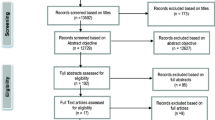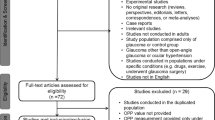Abstract
Background
Caffeine is widely consumed, and its effect on intraocular pressure (IOP) has been reported in conflicting data. The aim of this meta-analysis was to quantitatively summarize the effect of caffeine on IOP in normal individuals and in patients with glaucoma or ocular hypertension (OHT).
Methods
A comprehensive literature search was performed using the Cochrane Collaboration methodology to identify pertinent randomized controlled trials (RCTs) from the Cochrane Central Register of Controlled Trials (CENTRAL), PubMed and EMBASE. A systematic review and meta-analysis was performed. IOP at 0.5 hour (h), 1 h and 1.5 h after caffeine ingestion was the main outcome measurement.
Results
Six RCTs (two parallel-designed and four crossover-designed) evaluating 144 participants fulfilled inclusion criteria. The risk of bias for these studies was uncertain. Among the participants, 103 were normal individuals and 41 were patients with glaucoma or OHT. In normal individuals, the IOPs measured at 0.5 h, 1 h and 1.5 h post-intervention were not affected by ingestion of caffeine. The weighted mean difference (WMD) with 95% confidence intervals (95%CI) for each measurement point were −0.740 (–2.454, 0.974), 0.522 (–0.568, 1.613) and 0.580 (–1.524, 2.684). However, in patients with glaucoma or OHT, IOP increased at each measurement point, with the WMD and 95%CI being 0.347 (0.078, 0.616), 2.395 (1.741,3.049) and 1.998 (1.522,2.474) respectively. No publication bias was detected by either Begg’s or Egger’s test.
Conclusion
Available evidences showed that caffeine had different effects on IOP in different groups of individuals. For normal individuals, IOP was not changed by ingestion of caffeine, while for patients with glaucoma or OHT, IOP increased significantly. More high-quality RCTs are warranted to confirm this. The mechanisms underlying this phenomenon and the clinical significance are to be explored.

Similar content being viewed by others
References
Wikipedia c (2009) Caffeine. Wikipedia, The Free Encyclopedia. available from http://en.wikipedia.org/w/index.php?title=Caffeine&oldid=320136971 Accessed July 31,2009
Benowitz NL (1990) Clinical pharmacology of caffeine. Annu Rev Med 41:277–288
Avisar R, Avisar E, Weinberger D (2002) Effect of coffee consumption on intraocular pressure. Ann Pharmacother 36:992–995
Ajayi OB, Ukwade MT (2001) Caffeine and intraocular pressure in a Nigerian population. J Glaucoma 10:25–31
Higginbotham EJ, Kilimanjaro HA, Wilensky JT, Batenhorst RL, Hermann D (1989) The effect of caffeine on intraocular pressure in glaucoma patients. Ophthalmology 96:624–626
Okimi PH, Sportsman S, Pickard MR, Fritsche MB (1991) Effects of caffeinated coffee on intraocular pressure. Appl Nurs Res 4:72–76
Ozkan B, Yuksel N, Anik Y, Altintas O, Demirci A, Caglar Y (2008) The effect of caffeine on retrobulbar hemodynamics. Curr Eye Res 33:804–809
Okuno T, Sugiyama T, Tominaga M, Kojima S, Ikeda T (2002) Effects of caffeine on microcirculation of the human ocular fundus. Jpn J Ophthalmol 46:170–176
Nemesure B, Honkanen R, Hennis A, Wu SY, Leske MC (2007) Incident open-angle glaucoma and intraocular pressure. Ophthalmology 114:1810–1815
Leske MC, Connell AM, Wu SY, Nemesure B, Li X, Schachat A, Hennis A (2001) Incidence of open-angle glaucoma: the Barbados Eye Studies. The Barbados Eye Studies Group. Arch Ophthalmol 119:89–95
Leske MC, Heijl A, Hussein M, Bengtsson B, Hyman L, Komaroff E (2003) Factors for glaucoma progression and the effect of treatment: the Early Manifest Glaucoma Trial. Arch Ophthalmol 121:48–56
Gordon MO, Beiser JA, Brandt JD, Heuer DK, Higginbotham EJ, Johnson CA, Keltner JL, Miller JP, Parrish RK 2nd, Wilson MR, Kass MA (2002) The Ocular Hypertension Treatment Study: baseline factors that predict the onset of primary open-angle glaucoma. Arch Ophthalmol 120:714–720, discussion 829-730
Higginbotham EJ, Gordon MO, Beiser JA, Drake MV, Bennett GR, Wilson MR, Kass MA (2004) The Ocular Hypertension Treatment Study: topical medication delays or prevents primary open-angle glaucoma in African American individuals. Arch Ophthalmol 122:813–820
AGIS Investigators (2000) The Advanced Glaucoma Intervention Study (AGIS): 7. The relationship between control of intraocular pressure and visual field deterioration. Am J Ophthalmol 130:429–440
Spaeth GL (2002) Re: Ajayi OB, Ukwade NT. Caffeine and intraocular pressure in Nigerian population. (J Glaucoma 2001;10:25-31). J Glaucoma 11:76
Quigley HA, Broman AT (2006) The number of people with glaucoma worldwide in 2010 and 2020. Br J Ophthalmol 90:262–267
Lefebvre C, Manheimer M, Glanville J (2009) Chapter 6:Searching for studies. In: Higgins J, Green S (eds) Cochrane handbook for systematic reviews of interventions. The Cochrane Collaboration. Available from www.cochranehandbook.org. Accessed July 31,2009
Higgins JPT, Altman DG (2008) Chapter 8: Assessing risk of bias in included studies. In: Higgins JPT, Altman DG (eds) Cochrane handbook for systematic reviews of interventions. The Cochrane Collaboration.Available from www.cochrane-handbook.org. Accessed July 31,2009
Higgins JPT, Deeks JJ, Altman DG (2009) Chapter 16: Special topics in statistics. In: Higgins J, Green S (eds) Cochrane handbook for systematic reviews of interventions. The Ccochrane Collaboration.Available from www.cochranehandbook.org. Accessed July 31,2009
Higgins JP, Thompson SG, Deeks JJ, Altman DG (2003) Measuring inconsistency in meta-analyses. BMJ 327:557–560
Begg CB, Mazumdar M (1994) Operating characteristics of a rank correlation test for publication bias. Biometrics 50:1088–1101
Egger M, Davey Smith G, Schneider M, Minder C (1997) Bias in meta-analysis detected by a simple, graphical test. BMJ 315:629–634
Deeks JJ, Higgins JPT, Altman DG (2008.) Chapter 9: Analysing data and undertaking meta-analyses. In: Higgins JPT, Green S (eds) Cochrane handbook for systematic reviews of interventions version 501 (updated September 2008). The Cochrane Collaboration. Available from www.cochrane-handbook.org. Accessed July 31,2009
Sterne JAC, Bradburn MJ, Egger M (2001) 18 Meta-analysis in StataTM. In: Egger M, Smith GD, Altman DG (eds) Systematic reviews in health care:meta-analysis in context. BMJ Publishing Group, London, pp 347–369
Kurata K, Fujimoto H, Tsukuda R, Suzuki T, Ando T, Tokuriki M (1998) Aqueous humor dynamics in beagle dogs with caffeine-induced ocular hypertension. J Vet Med Sci 60:737–739
Genee E (1973) Effect of vasoactive drugs on intra-ocular pressure. Klin Monbl Augenheilkd 162:637–642
Opremcak EM, Weber PA (1985) Interaction of timolol and caffeine on intraocular pressure. J Ocul Pharmacol 1:227–234
Strempel I (1979) Timolol: long-term results, tolerance test and early-morning measurements (author's transl). Klin Monbl Augenheilkd 175:619–626
Graeber W (1968) On the effect of caffeine on intraocular pressure in surgically or conservatively managed simple chronic glaucoma. Klin Monbl Augenheilkd 152:357–365
Alekseev BN, Ziangirova GG, Pisetskaia SF, Malakhova LA (1983) [M. M. Krasnov's caffeine therapy in treating ciliochoroidal detachment (an experimental-clinical study)]. Vestn Oftalmol: 11–14
Lotfi K, Grunwald JE (1991) The effect of caffeine on the human macular circulation. Investig Ophthalmol Vis Sci 32:3028–3032
Hinzpeter B, Diestelhorst M (1992) [1, 3, 7-trimethylxanthine. Effects on circadian aqueous humor dynamics in probands]. Ophthalmologe 89:465–467
Mozaffarieh M, Flammer J (2007) Is there more to glaucoma treatment than lowering IOP? Surv Ophthalmol 52(Suppl 2):S174–S179
Mozaffarieh M, Grieshaber MC, Orgul S, Flammer J (2008) The potential value of natural antioxidative treatment in glaucoma. Surv Ophthalmol 53:479–505
Mozaffarieh M, Flammer J (2007) A novel perspective on natural therapeutic approaches in glaucoma therapy. Expert Opin Emerg Drugs 12:195–198
Johnson S (2001) The multifaceted and widespread pathology of magnesium deficiency. Med Hypotheses 56:163–170
Adams BA, Brubaker RF (1990) Caffeine has no clinically significant effect on aqueous humor flow in the normal human eye. Ophthalmology 97:1030–1031
Kurata K, Maeda M, Nishida E, Tsukuda R, Suzuki T, Ando T, Tokuriki M (1997) Relationship between caffeine-induced ocular hypertension and ultrastructure changes of non-pigmented ciliary epithelial cells in rats. J Toxicol Sci 22:447–454
Kang JH, Willett WC, Rosner BA, Hankinson SE, Pasquale LR (2008) Caffeine consumption and the risk of primary open-angle glaucoma: a prospective cohort study. Invest Ophthalmol Vis Sci 49:1924–1931
Chandrasekaran S, Rochtchina E, Mitchell P (2005) Effects of caffeine on intraocular pressure: the Blue Mountains Eye Study. J Glaucoma 14:504–507
Cornelis MC, El-Sohemy A, Kabagambe EK, Campos H (2006) Coffee, CYP1A2 genotype, and risk of myocardial infarction. JAMA 295:1135–1141
Drance SM (1963) Diurnal variation of intraocular pressure in treated glaucoma. Significance in patients with chronic simple glaucoma. Arch Ophthalmol 70:302–311
De Venecia G, Davis MD (1963) Diurnal variation of intraocular pressure in the normal eye. Arch Ophthalmol 69:752–757
Kotecha A, White ET, Shewry JM, Garway-Heath DF (2005) The relative effects of corneal thickness and age on Goldmann applanation tonometry and dynamic contour tonometry. Br J Ophthalmol 89:1572–1575
Orssengo GJ, Pye DC (1999) Determination of the true intraocular pressure and modulus of elasticity of the human cornea in vivo. Bull Math Biol 61:551–572
Tonnu PA, Ho T, Newson T, El Sheikh A, Sharma K, White E, Bunce C, Garway-Heath D (2005) The influence of central corneal thickness and age on intraocular pressure measured by pneumotonometry, non-contact tonometry, the Tono-Pen XL, and Goldmann applanation tonometry. Br J Ophthalmol 89:851–854
Stodtmeister R (2002) Central corneal thickness on GAT (Goldman applanation tonometry accuracy). J Glaucoma 11:543
Lleo A, Marcos A, Calatayud M, Alonso L, Rahhal SM, Sanchis-Gimeno JA (2003) The relationship between central corneal thickness and Goldmann applanation tonometry. Clin Exp Optom 86:104–108
Recep OF, Hasiripi H, Cagil N, Sarikatipoglu H (2001) Relation between corneal thickness and intraocular pressure measurement by noncontact and applanation tonometry. J Cataract Refract Surg 27:1787–1791
Rudnicka AR, Mt-Isa S, Owen CG, Cook DG, Ashby D (2006) Variations in primary open-angle glaucoma prevalence by age, gender, and race: a Bayesian meta-analysis. Investig Ophthalmol Vis Sci 47:4254–4261
Author information
Authors and Affiliations
Corresponding author
Additional information
No authors have any financial/conflicting interests to disclose. There is no funding or financial support.The authors have full control of all primary data, and we agree to allow Graefe's Archive for Clinical and Experimental Ophthalmology to review our data upon request.
Rights and permissions
About this article
Cite this article
Li, M., Wang, M., Guo, W. et al. The effect of caffeine on intraocular pressure: a systematic review and meta-analysis. Graefes Arch Clin Exp Ophthalmol 249, 435–442 (2011). https://doi.org/10.1007/s00417-010-1455-1
Received:
Revised:
Accepted:
Published:
Issue Date:
DOI: https://doi.org/10.1007/s00417-010-1455-1




